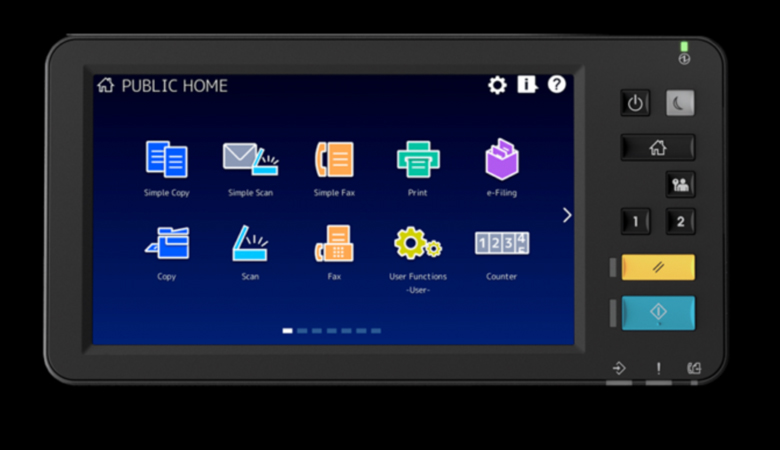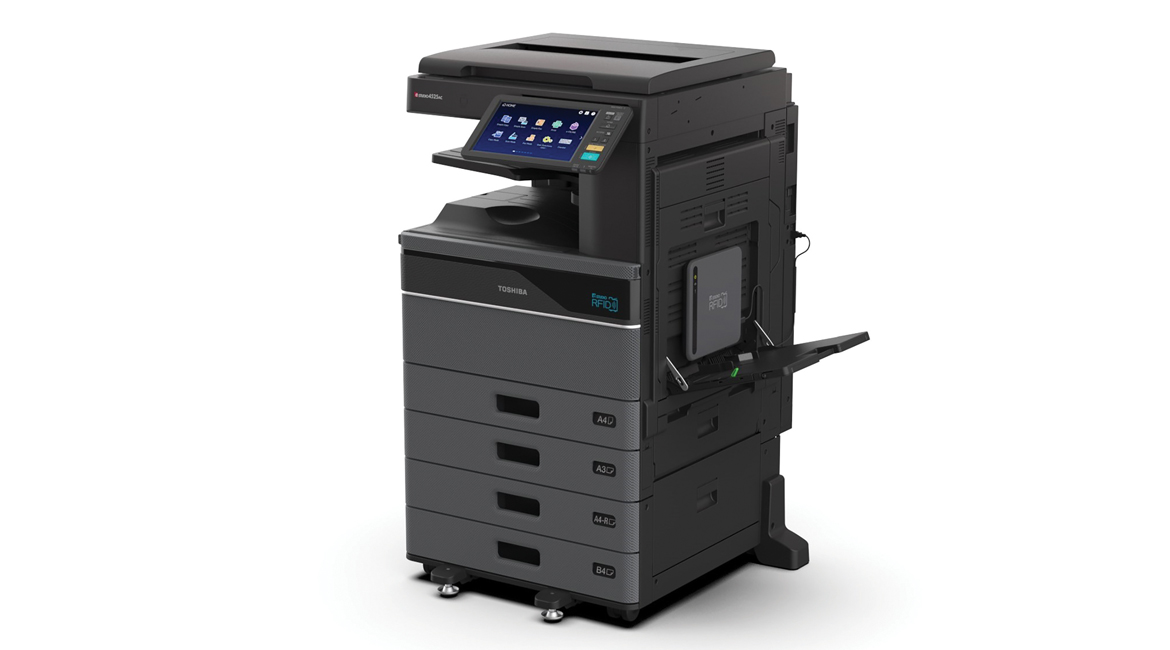Above: The e‐STUDIO 4525AC RFID
The e-STUDIO 4525AC RFID is currently available in Japan.
In mid-October, Toshiba TEC, the company responsible for manufacturing and selling Toshiba copiers, announced the release in Japan of the industry’s first A3 color MFP with RFID writer capability. RFID, or radio-frequency identification, is an automatic recognition technology that uses short-distance wireless communication to read data from specific tags and recognize their contents. This technology can read multiple RFID data from several meters away and even through multiple packaging layers, making inventory and inspection tasks more efficient at retail stores, factories, and logistics warehouses. We often see product tags with RFID when we purchase apparel, but the RFID we usually encounter is only attached to small tags or labels.
In various industries, including manufacturing, logistics, and retail, there is a need for larger A4 and A3 sheets that can be annotated during each stage of the manufacturing and distribution process while also utilizing RFID for comprehensive item management. To meet this need, Toshiba TEC developed the e-STUDIO 4525AC RFID. This A3 color MFP is a pioneering development in the industry, capable of printing in full color on paper while simultaneously writing data to RFID. It is currently available only in the Japanese market.
The e-STUDIO 4525AC RFID can store up to 100 sheets of specialized paper, each affixed with an RFID tag, in a two-stage cassette. The machine’s built-in RFID writer can simultaneously write data to these tags and print corresponding management information or process charts in color on the front of the sheets. The position of the RFID tags can be customized to the user’s preferences. Due to the void processing that ensures correct data writing to the RFID tags, the continuous print speed during RFID writing is 12 sheets per minute (A4 horizontal), which is slower than the machine’s regular print speed.
Toshiba Tec’s e-STUDIO 4525AC RFID Case Study
Now, let’s look at a real-world application of the e-STUDIO 4525AC RFID to understand its contribution to business operations. A specific use case will illustrate how this innovative machine is already proving its worth in the field.
Toshiba TEC’s e-STUDIO 4525AC RFID is already being used effectively by a company that remodels randoseru (Japanese school backpacks made of leather, traditionally used by elementary school children). These bags are cherished items, often filled with memories of childhood and school days, as children use them from the time they enter school until they graduate.
This sentimentality associated with the randoseru has given rise to companies that remodel these used backpacks into other leather items such as wallets, card holders, and key holders. One such remaking company receives about 25,000 randoseru annually from across Japan, a number that is on the rise, prompting the need for more efficient processing systems to handle up to 100,000 items yearly.

Above: The e‐STUDIO 4525AC RFID control panel.
Previously, when an order for remaking was received, the company would send the customer three separate A4 sheets—an order slip, an application form, and an address label. The customer would fill these out, place them in the randoseru to be remodeled, and send it back. However, this process was cumbersome, prone to errors, and not scalable with the increasing volume of orders. Additionally, each randoseru was managed by barcode, and the manual process of scanning each barcode individually during storage was time-consuming.
The remaking company, aiming to process 100,000 items annually, focused on providing absolute value and eliminating human error. They streamlined the process by consolidating the paperwork required from clients into a single sheet for enhanced safety and established a system for individual item management to increase reliability. Toshiba TEC facilitated this improvement by offering the e‐STUDIO 4525AC RFID, which employs special paper affixed with RFID.
The A3-sized paper, used by clients to enter their information and instructions, is integrated with an RFID tag encoded with the order number. This innovation ensures that the randoseru is always paired with the RFID-tagged sheet, enabling precise individual management. When customers send their randoseru accompanied by the RFID-tagged application form, the adoption of RFID allows up to 30 items to be processed simultaneously.
Workers can place them on a trolley and complete the storage process while on the move, leading to a significant reduction in work time. Both the paper dispatching and storage tasks combined resulted in an approximately 20% reduction in operational time.
By leveraging Toshiba TEC’s e‐STUDIO 4525AC RFID, the remaking company was not only able to reduce operation time but also achieved individual management of each randoseru. This enhancement allowed clients to feel an unprecedented level of assurance. It also equipped the company with the capacity to handle a larger volume of orders, propelling them towards their goal of processing 100,000 items.




